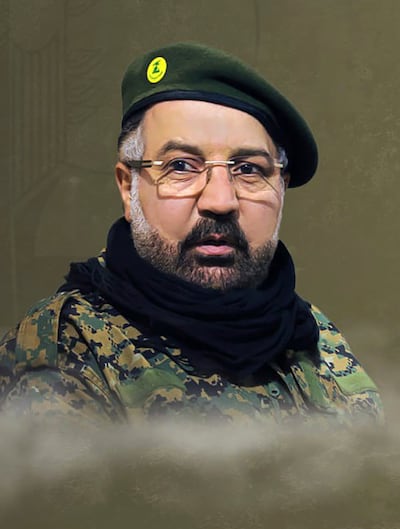Live updates: Follow the latest on Israel-Gaza
Lebanon's Hezbollah confirmed the death of its senior commander Fouad Shukr on Wednesday, a day after an Israeli strike hit a residential building in southern Beirut.
Hezbollah described Mr Shukr as "a great martyr on the road to Jerusalem", a phrase the group often uses to describe its members being killed.
An Iranian military adviser, Milad Bedi, was killed in the same strike, Iran's Fars news agency reported soon after the announcement of Mr Shukr's death.
As rescue efforts came to a close on Wednesday evening, the final death toll from the Israeli strike on the southern Beirut suburb stood at seven people: three women and two children, and Mr Shukr and Mr Bedi.
At least 74 people were injured in the attack.
Hezbollah leader Hassan Nasrallah is expected to speak on Thursday, to express the group's "political stance on this heinous attack and major crime", the statement added.
Mr Shukr is the most senior Hezbollah commander to be killed since Mustafa Badreddine was assassinated in Syria in 2016.
After announcing his death, Hezbollah released pictures of Mr Shukr with Mr Nasrallah and Mr Badreddine, as well as the former leader of Iran's Quds Force Qassem Suleimani and Hezbollah's former military leader, Imad Mughniyeh.
The last two have since been assassinated.
Three other Hezbollah commanders have been killed since hostilities broke out between Israel and Hezbollah in October.
Hezbollah had previously said Mr Shukr's fate was unknown, contradicting a statement from the Israeli army that announced his “elimination” on Tuesday night after the strike hit Beirut's Haret Hreik neighbourhood.
Hezbollah initially refrained from announcing the death of Mr Shukr, until his body was found under the rubble later in the day.
Israeli Prime Minister Benjamin Netanyahu hailed the Israeli military for killing Mr Shukr in a speech on Wednesday evening, describing it as one of several "crushing blows" against Iranian allies in the region over recent days.
Israel has described Mr Shukr as Hezbollah's most senior military commander and the right-hand man of the group’s leader, Hassan Nasrallah.
The US has said Mr Shukr played a central role in the October 1983 bombing of the US Marine Corps barracks in Beirut that killed 241 American personnel and wounded 128.

Israel said Mr Shukr ordered the strike on the Israeli-occupied Golan Heights that killed 12 children at the weekend, and described the strike on Beirut as revenge for that attack.
Mr Netanyahu had vowed a "severe" response against Hezbollah, while other Israeli leaders declared they were now in "all out war". Hezbollah has denied any involvement in the attack.
Mr Shukr was also responsible for “the killing of numerous additional Israeli civilians”, the Israeli military said.
Israeli Defence Minister Yoav Gallant posted a short message on X after the attack, stating: "Hezbollah crossed the red line".
The Lebanese group has launched attacks on sites in northern Israel and the Golan Heights as part of a wider, Iran-led retaliation against Israel over the war in Gaza, which has killed more than 39,400 Palestinians since October 7.
Hezbollah will plan to respond to any Israeli retaliation for the Majdal Shams attack and has rejected diplomatic efforts to convince it otherwise, sources close to the group told The National on Tuesday, before the Beirut strike took place.
Previous attacks on Hezbollah commanders have been met with retaliation from the Iran-backed group.
By attacking the Lebanese capital, Israel will be seen by Hezbollah as having escalated the conflict again.
Since October, Israel has mainly concentrated its strikes on southern Lebanon, although it did assassinate Hamas deputy leader Saleh Al Arouri in Beirut in January.
Fears of a regional war were heightened even more by the killing of Hamas leader Ismail Haniyeh in Iran on Wednesday morning, just hours after the strike on Dahieh.
Mr Haniyeh was killed in a strike on his Tehran residence, Hamas said in a statement. The Hamas leader was in Iran to attend the inauguration of President Masoud Pezeshkian.
Iran’s Islamic Revolutionary Guard Corps also announced Mr Haniyeh’s death.
“Early this morning, the residence of Ismail Haniyeh in Tehran was struck, resulting in his and one of his bodyguards’ martyrdom. The cause is under investigation and will be announced soon,” the IRGC said.
Israel has not yet commented on Mr Haniyeh’s assassination.
